Land Registration Systems Comparison
VerifiedAdded on 2020/06/04
|9
|2495
|82
AI Summary
This assignment delves into a comparative analysis of land registration systems in England and Wales and Jamaica. It examines the historical evolution of these systems, the legal frameworks governing them, and highlights the significant differences between the two approaches. The document also touches upon the objectives and challenges associated with land registration in both jurisdictions.
Contribute Materials
Your contribution can guide someone’s learning journey. Share your
documents today.
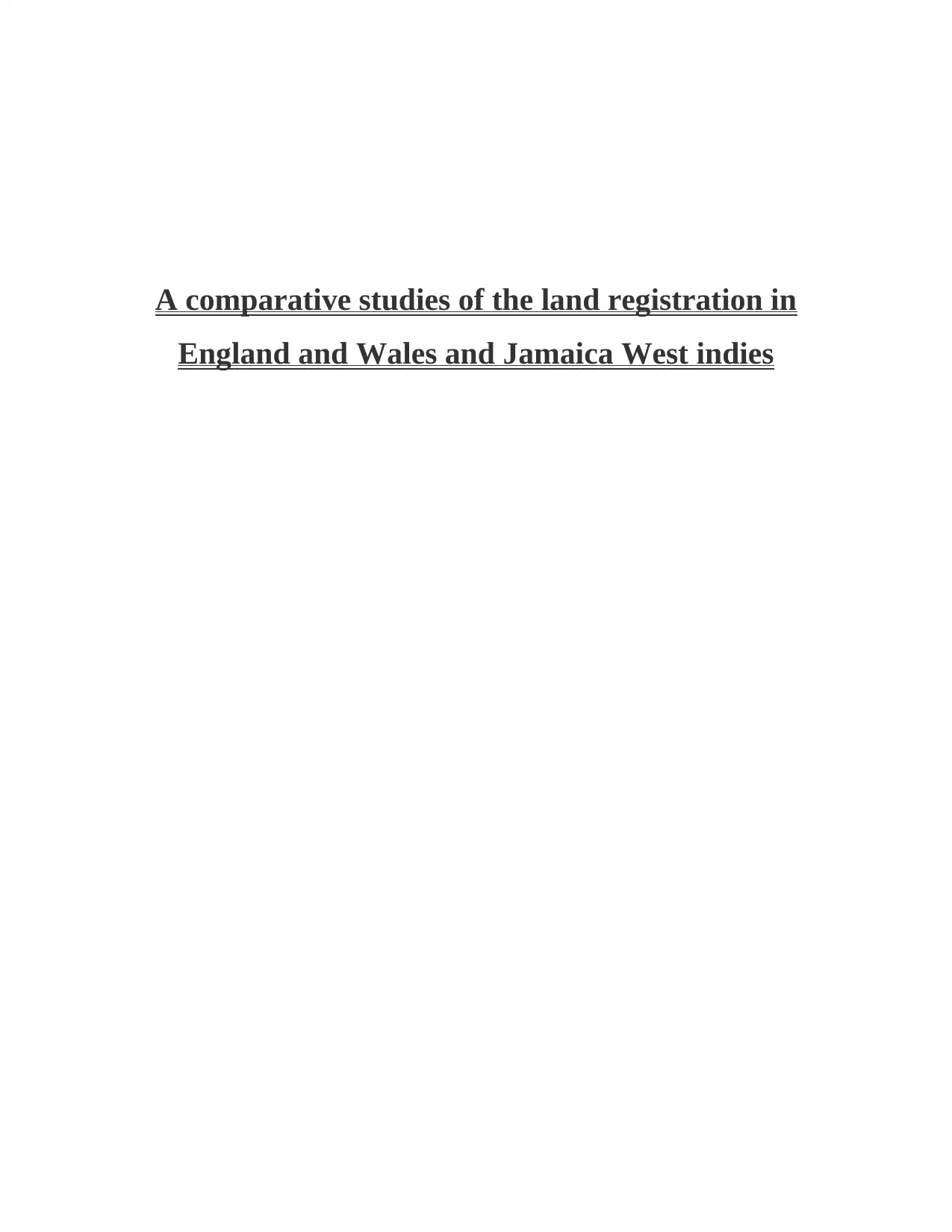
A comparative studies of the land registration in
England and Wales and Jamaica West indies
England and Wales and Jamaica West indies
Secure Best Marks with AI Grader
Need help grading? Try our AI Grader for instant feedback on your assignments.
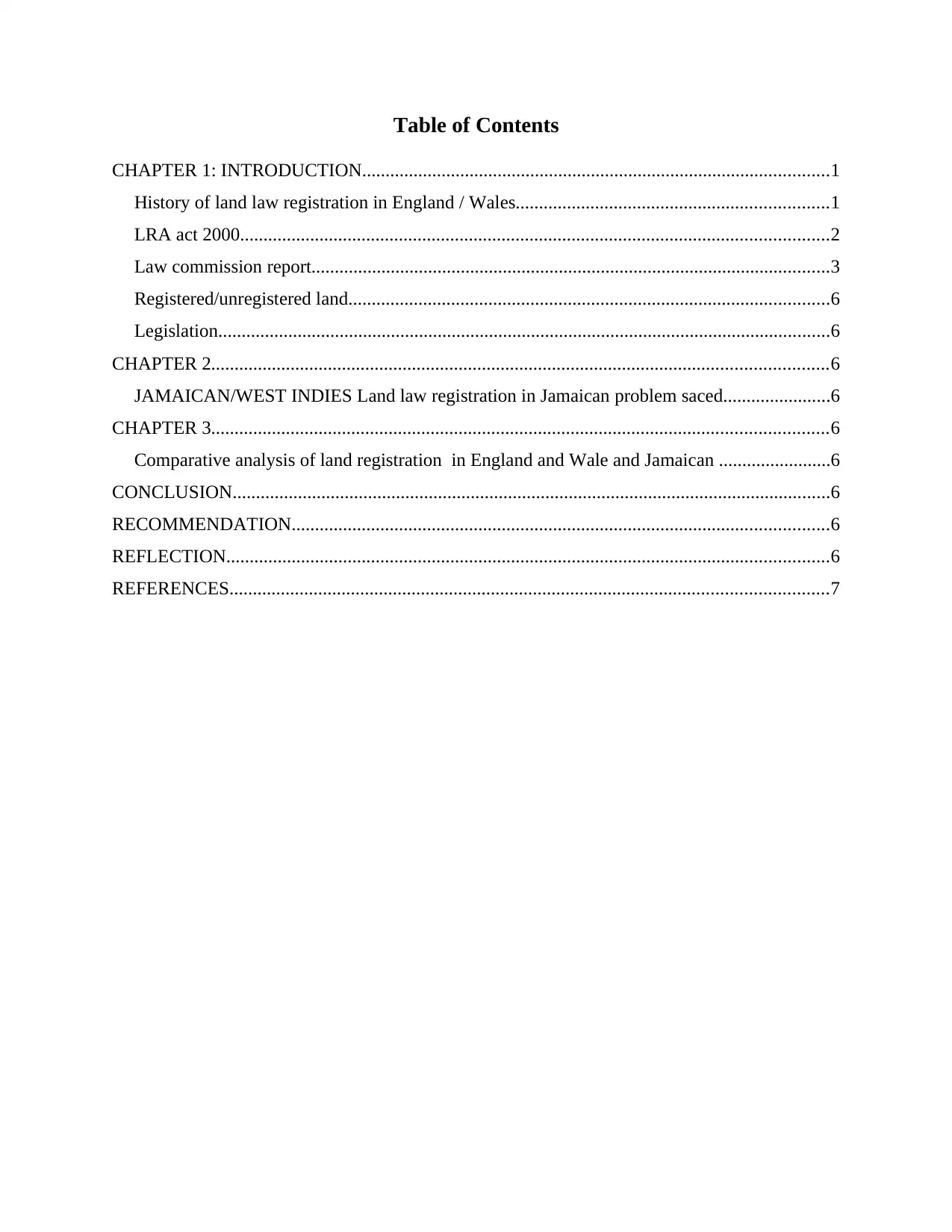
Table of Contents
CHAPTER 1: INTRODUCTION....................................................................................................1
History of land law registration in England / Wales...................................................................1
LRA act 2000..............................................................................................................................2
Law commission report...............................................................................................................3
Registered/unregistered land.......................................................................................................6
Legislation...................................................................................................................................6
CHAPTER 2....................................................................................................................................6
JAMAICAN/WEST INDIES Land law registration in Jamaican problem saced.......................6
CHAPTER 3....................................................................................................................................6
Comparative analysis of land registration in England and Wale and Jamaican ........................6
CONCLUSION................................................................................................................................6
RECOMMENDATION...................................................................................................................6
REFLECTION.................................................................................................................................6
REFERENCES................................................................................................................................7
CHAPTER 1: INTRODUCTION....................................................................................................1
History of land law registration in England / Wales...................................................................1
LRA act 2000..............................................................................................................................2
Law commission report...............................................................................................................3
Registered/unregistered land.......................................................................................................6
Legislation...................................................................................................................................6
CHAPTER 2....................................................................................................................................6
JAMAICAN/WEST INDIES Land law registration in Jamaican problem saced.......................6
CHAPTER 3....................................................................................................................................6
Comparative analysis of land registration in England and Wale and Jamaican ........................6
CONCLUSION................................................................................................................................6
RECOMMENDATION...................................................................................................................6
REFLECTION.................................................................................................................................6
REFERENCES................................................................................................................................7
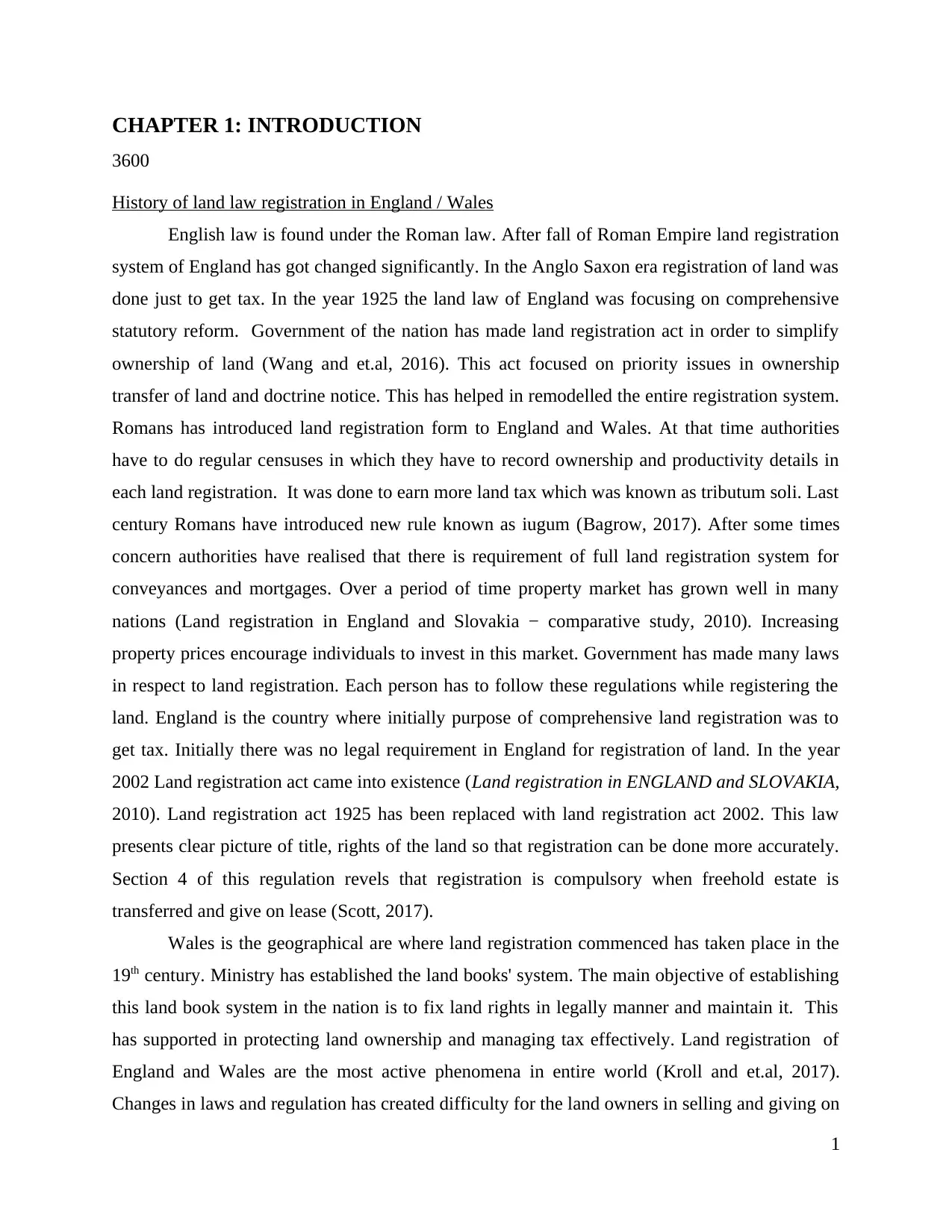
CHAPTER 1: INTRODUCTION
3600
History of land law registration in England / Wales
English law is found under the Roman law. After fall of Roman Empire land registration
system of England has got changed significantly. In the Anglo Saxon era registration of land was
done just to get tax. In the year 1925 the land law of England was focusing on comprehensive
statutory reform. Government of the nation has made land registration act in order to simplify
ownership of land (Wang and et.al, 2016). This act focused on priority issues in ownership
transfer of land and doctrine notice. This has helped in remodelled the entire registration system.
Romans has introduced land registration form to England and Wales. At that time authorities
have to do regular censuses in which they have to record ownership and productivity details in
each land registration. It was done to earn more land tax which was known as tributum soli. Last
century Romans have introduced new rule known as iugum (Bagrow, 2017). After some times
concern authorities have realised that there is requirement of full land registration system for
conveyances and mortgages. Over a period of time property market has grown well in many
nations (Land registration in England and Slovakia − comparative study, 2010). Increasing
property prices encourage individuals to invest in this market. Government has made many laws
in respect to land registration. Each person has to follow these regulations while registering the
land. England is the country where initially purpose of comprehensive land registration was to
get tax. Initially there was no legal requirement in England for registration of land. In the year
2002 Land registration act came into existence (Land registration in ENGLAND and SLOVAKIA,
2010). Land registration act 1925 has been replaced with land registration act 2002. This law
presents clear picture of title, rights of the land so that registration can be done more accurately.
Section 4 of this regulation revels that registration is compulsory when freehold estate is
transferred and give on lease (Scott, 2017).
Wales is the geographical are where land registration commenced has taken place in the
19th century. Ministry has established the land books' system. The main objective of establishing
this land book system in the nation is to fix land rights in legally manner and maintain it. This
has supported in protecting land ownership and managing tax effectively. Land registration of
England and Wales are the most active phenomena in entire world (Kroll and et.al, 2017).
Changes in laws and regulation has created difficulty for the land owners in selling and giving on
1
3600
History of land law registration in England / Wales
English law is found under the Roman law. After fall of Roman Empire land registration
system of England has got changed significantly. In the Anglo Saxon era registration of land was
done just to get tax. In the year 1925 the land law of England was focusing on comprehensive
statutory reform. Government of the nation has made land registration act in order to simplify
ownership of land (Wang and et.al, 2016). This act focused on priority issues in ownership
transfer of land and doctrine notice. This has helped in remodelled the entire registration system.
Romans has introduced land registration form to England and Wales. At that time authorities
have to do regular censuses in which they have to record ownership and productivity details in
each land registration. It was done to earn more land tax which was known as tributum soli. Last
century Romans have introduced new rule known as iugum (Bagrow, 2017). After some times
concern authorities have realised that there is requirement of full land registration system for
conveyances and mortgages. Over a period of time property market has grown well in many
nations (Land registration in England and Slovakia − comparative study, 2010). Increasing
property prices encourage individuals to invest in this market. Government has made many laws
in respect to land registration. Each person has to follow these regulations while registering the
land. England is the country where initially purpose of comprehensive land registration was to
get tax. Initially there was no legal requirement in England for registration of land. In the year
2002 Land registration act came into existence (Land registration in ENGLAND and SLOVAKIA,
2010). Land registration act 1925 has been replaced with land registration act 2002. This law
presents clear picture of title, rights of the land so that registration can be done more accurately.
Section 4 of this regulation revels that registration is compulsory when freehold estate is
transferred and give on lease (Scott, 2017).
Wales is the geographical are where land registration commenced has taken place in the
19th century. Ministry has established the land books' system. The main objective of establishing
this land book system in the nation is to fix land rights in legally manner and maintain it. This
has supported in protecting land ownership and managing tax effectively. Land registration of
England and Wales are the most active phenomena in entire world (Kroll and et.al, 2017).
Changes in laws and regulation has created difficulty for the land owners in selling and giving on
1
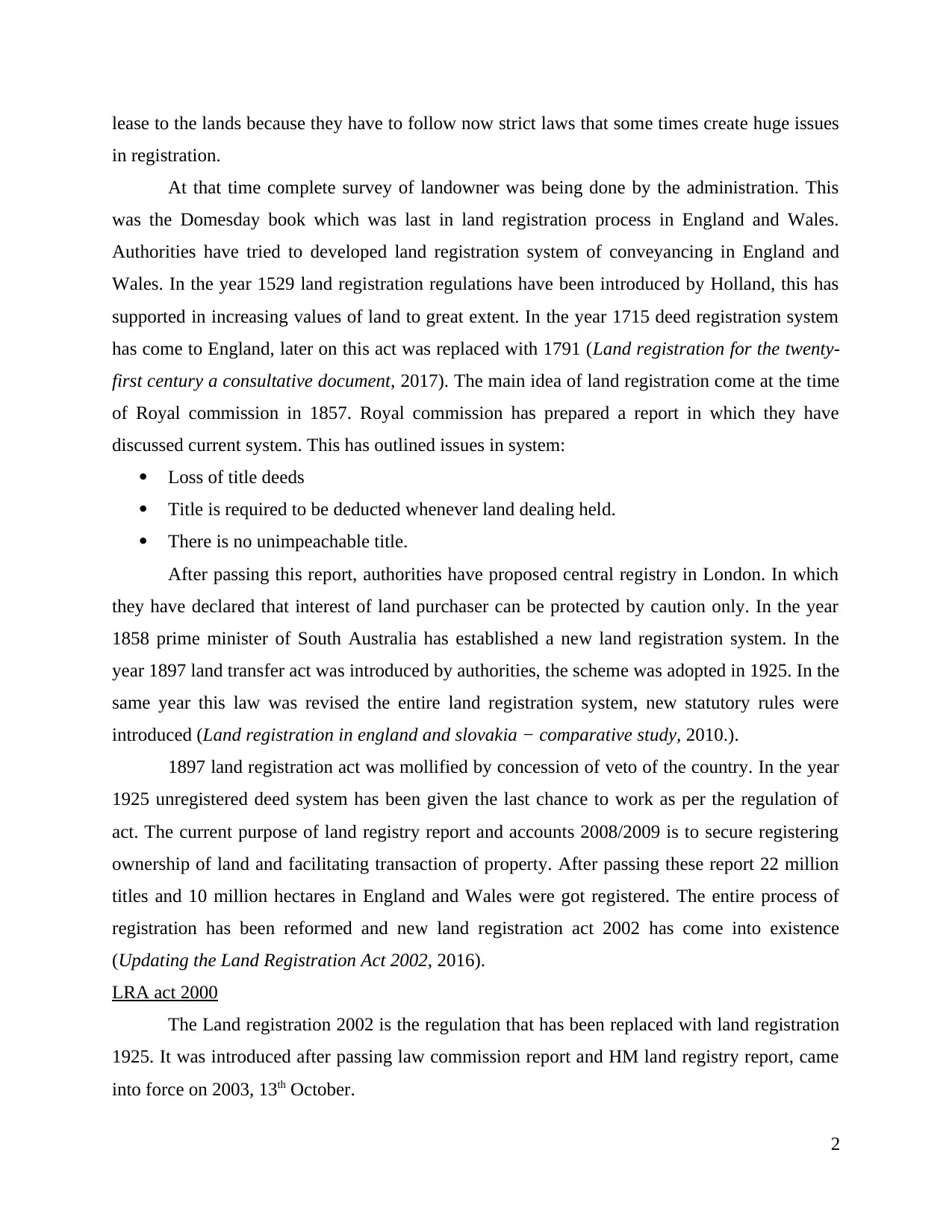
lease to the lands because they have to follow now strict laws that some times create huge issues
in registration.
At that time complete survey of landowner was being done by the administration. This
was the Domesday book which was last in land registration process in England and Wales.
Authorities have tried to developed land registration system of conveyancing in England and
Wales. In the year 1529 land registration regulations have been introduced by Holland, this has
supported in increasing values of land to great extent. In the year 1715 deed registration system
has come to England, later on this act was replaced with 1791 (Land registration for the twenty-
first century a consultative document, 2017). The main idea of land registration come at the time
of Royal commission in 1857. Royal commission has prepared a report in which they have
discussed current system. This has outlined issues in system:
Loss of title deeds
Title is required to be deducted whenever land dealing held.
There is no unimpeachable title.
After passing this report, authorities have proposed central registry in London. In which
they have declared that interest of land purchaser can be protected by caution only. In the year
1858 prime minister of South Australia has established a new land registration system. In the
year 1897 land transfer act was introduced by authorities, the scheme was adopted in 1925. In the
same year this law was revised the entire land registration system, new statutory rules were
introduced (Land registration in england and slovakia − comparative study, 2010.).
1897 land registration act was mollified by concession of veto of the country. In the year
1925 unregistered deed system has been given the last chance to work as per the regulation of
act. The current purpose of land registry report and accounts 2008/2009 is to secure registering
ownership of land and facilitating transaction of property. After passing these report 22 million
titles and 10 million hectares in England and Wales were got registered. The entire process of
registration has been reformed and new land registration act 2002 has come into existence
(Updating the Land Registration Act 2002, 2016).
LRA act 2000
The Land registration 2002 is the regulation that has been replaced with land registration
1925. It was introduced after passing law commission report and HM land registry report, came
into force on 2003, 13th October.
2
in registration.
At that time complete survey of landowner was being done by the administration. This
was the Domesday book which was last in land registration process in England and Wales.
Authorities have tried to developed land registration system of conveyancing in England and
Wales. In the year 1529 land registration regulations have been introduced by Holland, this has
supported in increasing values of land to great extent. In the year 1715 deed registration system
has come to England, later on this act was replaced with 1791 (Land registration for the twenty-
first century a consultative document, 2017). The main idea of land registration come at the time
of Royal commission in 1857. Royal commission has prepared a report in which they have
discussed current system. This has outlined issues in system:
Loss of title deeds
Title is required to be deducted whenever land dealing held.
There is no unimpeachable title.
After passing this report, authorities have proposed central registry in London. In which
they have declared that interest of land purchaser can be protected by caution only. In the year
1858 prime minister of South Australia has established a new land registration system. In the
year 1897 land transfer act was introduced by authorities, the scheme was adopted in 1925. In the
same year this law was revised the entire land registration system, new statutory rules were
introduced (Land registration in england and slovakia − comparative study, 2010.).
1897 land registration act was mollified by concession of veto of the country. In the year
1925 unregistered deed system has been given the last chance to work as per the regulation of
act. The current purpose of land registry report and accounts 2008/2009 is to secure registering
ownership of land and facilitating transaction of property. After passing these report 22 million
titles and 10 million hectares in England and Wales were got registered. The entire process of
registration has been reformed and new land registration act 2002 has come into existence
(Updating the Land Registration Act 2002, 2016).
LRA act 2000
The Land registration 2002 is the regulation that has been replaced with land registration
1925. It was introduced after passing law commission report and HM land registry report, came
into force on 2003, 13th October.
2
Secure Best Marks with AI Grader
Need help grading? Try our AI Grader for instant feedback on your assignments.
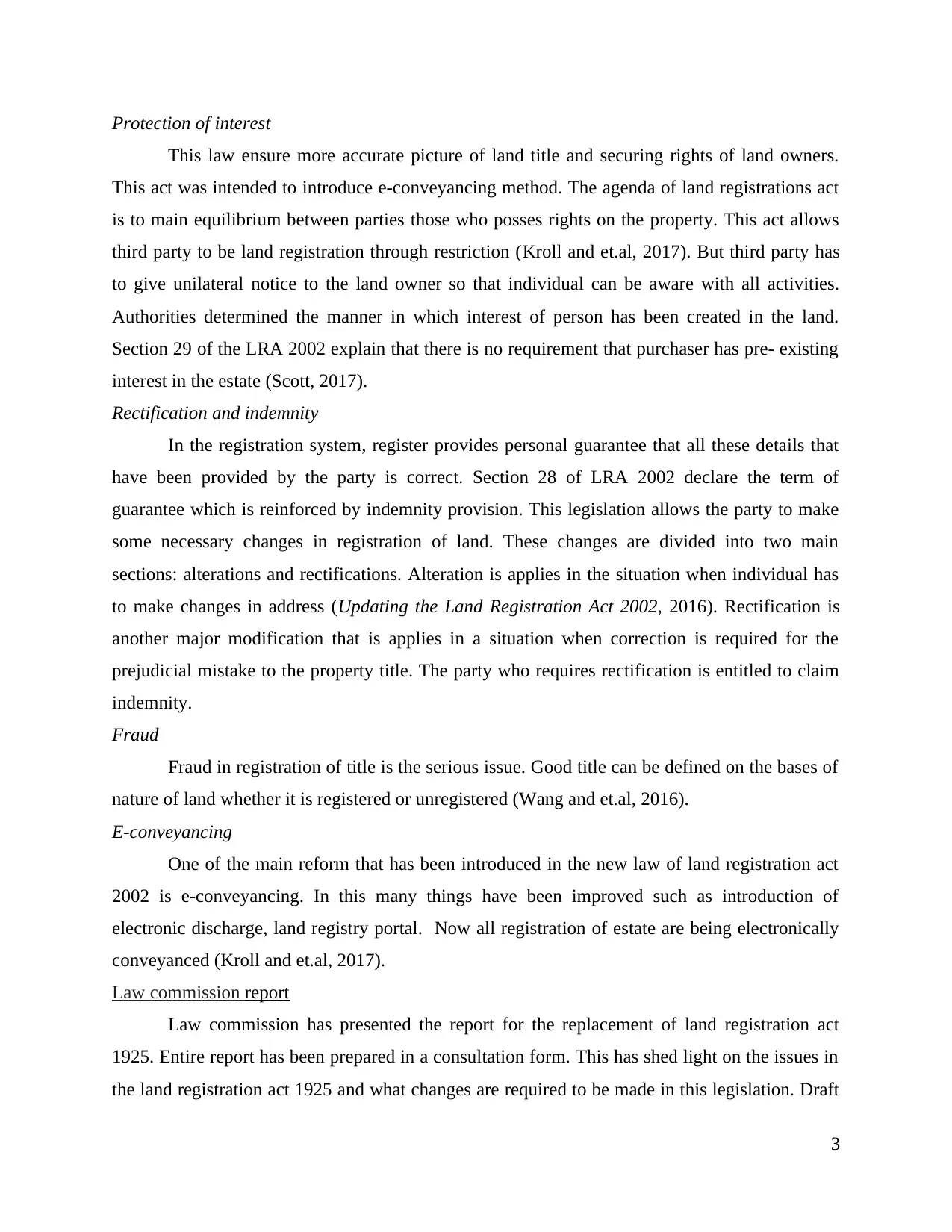
Protection of interest
This law ensure more accurate picture of land title and securing rights of land owners.
This act was intended to introduce e-conveyancing method. The agenda of land registrations act
is to main equilibrium between parties those who posses rights on the property. This act allows
third party to be land registration through restriction (Kroll and et.al, 2017). But third party has
to give unilateral notice to the land owner so that individual can be aware with all activities.
Authorities determined the manner in which interest of person has been created in the land.
Section 29 of the LRA 2002 explain that there is no requirement that purchaser has pre- existing
interest in the estate (Scott, 2017).
Rectification and indemnity
In the registration system, register provides personal guarantee that all these details that
have been provided by the party is correct. Section 28 of LRA 2002 declare the term of
guarantee which is reinforced by indemnity provision. This legislation allows the party to make
some necessary changes in registration of land. These changes are divided into two main
sections: alterations and rectifications. Alteration is applies in the situation when individual has
to make changes in address (Updating the Land Registration Act 2002, 2016). Rectification is
another major modification that is applies in a situation when correction is required for the
prejudicial mistake to the property title. The party who requires rectification is entitled to claim
indemnity.
Fraud
Fraud in registration of title is the serious issue. Good title can be defined on the bases of
nature of land whether it is registered or unregistered (Wang and et.al, 2016).
E-conveyancing
One of the main reform that has been introduced in the new law of land registration act
2002 is e-conveyancing. In this many things have been improved such as introduction of
electronic discharge, land registry portal. Now all registration of estate are being electronically
conveyanced (Kroll and et.al, 2017).
Law commission report
Law commission has presented the report for the replacement of land registration act
1925. Entire report has been prepared in a consultation form. This has shed light on the issues in
the land registration act 1925 and what changes are required to be made in this legislation. Draft
3
This law ensure more accurate picture of land title and securing rights of land owners.
This act was intended to introduce e-conveyancing method. The agenda of land registrations act
is to main equilibrium between parties those who posses rights on the property. This act allows
third party to be land registration through restriction (Kroll and et.al, 2017). But third party has
to give unilateral notice to the land owner so that individual can be aware with all activities.
Authorities determined the manner in which interest of person has been created in the land.
Section 29 of the LRA 2002 explain that there is no requirement that purchaser has pre- existing
interest in the estate (Scott, 2017).
Rectification and indemnity
In the registration system, register provides personal guarantee that all these details that
have been provided by the party is correct. Section 28 of LRA 2002 declare the term of
guarantee which is reinforced by indemnity provision. This legislation allows the party to make
some necessary changes in registration of land. These changes are divided into two main
sections: alterations and rectifications. Alteration is applies in the situation when individual has
to make changes in address (Updating the Land Registration Act 2002, 2016). Rectification is
another major modification that is applies in a situation when correction is required for the
prejudicial mistake to the property title. The party who requires rectification is entitled to claim
indemnity.
Fraud
Fraud in registration of title is the serious issue. Good title can be defined on the bases of
nature of land whether it is registered or unregistered (Wang and et.al, 2016).
E-conveyancing
One of the main reform that has been introduced in the new law of land registration act
2002 is e-conveyancing. In this many things have been improved such as introduction of
electronic discharge, land registry portal. Now all registration of estate are being electronically
conveyanced (Kroll and et.al, 2017).
Law commission report
Law commission has presented the report for the replacement of land registration act
1925. Entire report has been prepared in a consultation form. This has shed light on the issues in
the land registration act 1925 and what changes are required to be made in this legislation. Draft
3
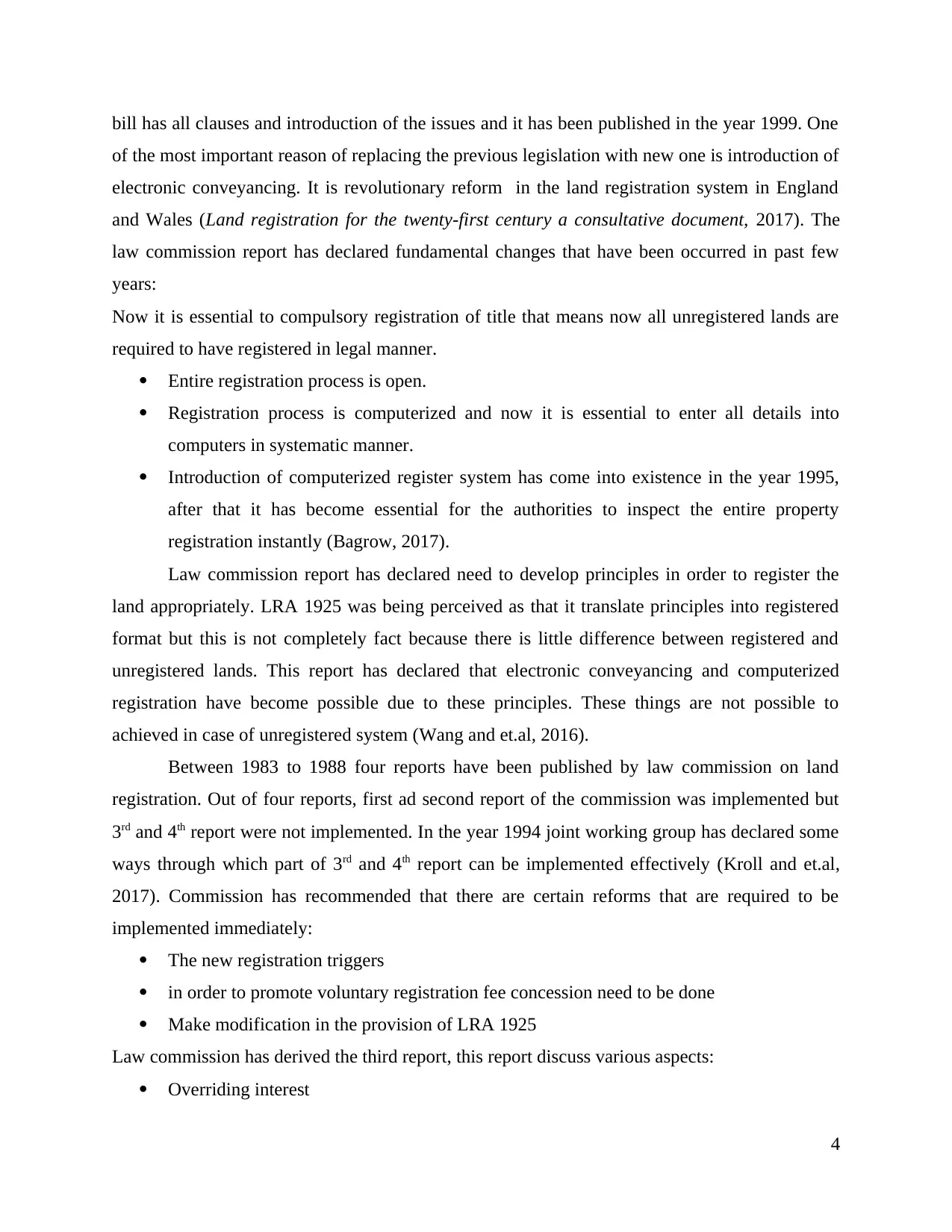
bill has all clauses and introduction of the issues and it has been published in the year 1999. One
of the most important reason of replacing the previous legislation with new one is introduction of
electronic conveyancing. It is revolutionary reform in the land registration system in England
and Wales (Land registration for the twenty-first century a consultative document, 2017). The
law commission report has declared fundamental changes that have been occurred in past few
years:
Now it is essential to compulsory registration of title that means now all unregistered lands are
required to have registered in legal manner.
Entire registration process is open.
Registration process is computerized and now it is essential to enter all details into
computers in systematic manner.
Introduction of computerized register system has come into existence in the year 1995,
after that it has become essential for the authorities to inspect the entire property
registration instantly (Bagrow, 2017).
Law commission report has declared need to develop principles in order to register the
land appropriately. LRA 1925 was being perceived as that it translate principles into registered
format but this is not completely fact because there is little difference between registered and
unregistered lands. This report has declared that electronic conveyancing and computerized
registration have become possible due to these principles. These things are not possible to
achieved in case of unregistered system (Wang and et.al, 2016).
Between 1983 to 1988 four reports have been published by law commission on land
registration. Out of four reports, first ad second report of the commission was implemented but
3rd and 4th report were not implemented. In the year 1994 joint working group has declared some
ways through which part of 3rd and 4th report can be implemented effectively (Kroll and et.al,
2017). Commission has recommended that there are certain reforms that are required to be
implemented immediately:
The new registration triggers
in order to promote voluntary registration fee concession need to be done
Make modification in the provision of LRA 1925
Law commission has derived the third report, this report discuss various aspects:
Overriding interest
4
of the most important reason of replacing the previous legislation with new one is introduction of
electronic conveyancing. It is revolutionary reform in the land registration system in England
and Wales (Land registration for the twenty-first century a consultative document, 2017). The
law commission report has declared fundamental changes that have been occurred in past few
years:
Now it is essential to compulsory registration of title that means now all unregistered lands are
required to have registered in legal manner.
Entire registration process is open.
Registration process is computerized and now it is essential to enter all details into
computers in systematic manner.
Introduction of computerized register system has come into existence in the year 1995,
after that it has become essential for the authorities to inspect the entire property
registration instantly (Bagrow, 2017).
Law commission report has declared need to develop principles in order to register the
land appropriately. LRA 1925 was being perceived as that it translate principles into registered
format but this is not completely fact because there is little difference between registered and
unregistered lands. This report has declared that electronic conveyancing and computerized
registration have become possible due to these principles. These things are not possible to
achieved in case of unregistered system (Wang and et.al, 2016).
Between 1983 to 1988 four reports have been published by law commission on land
registration. Out of four reports, first ad second report of the commission was implemented but
3rd and 4th report were not implemented. In the year 1994 joint working group has declared some
ways through which part of 3rd and 4th report can be implemented effectively (Kroll and et.al,
2017). Commission has recommended that there are certain reforms that are required to be
implemented immediately:
The new registration triggers
in order to promote voluntary registration fee concession need to be done
Make modification in the provision of LRA 1925
Law commission has derived the third report, this report discuss various aspects:
Overriding interest
4
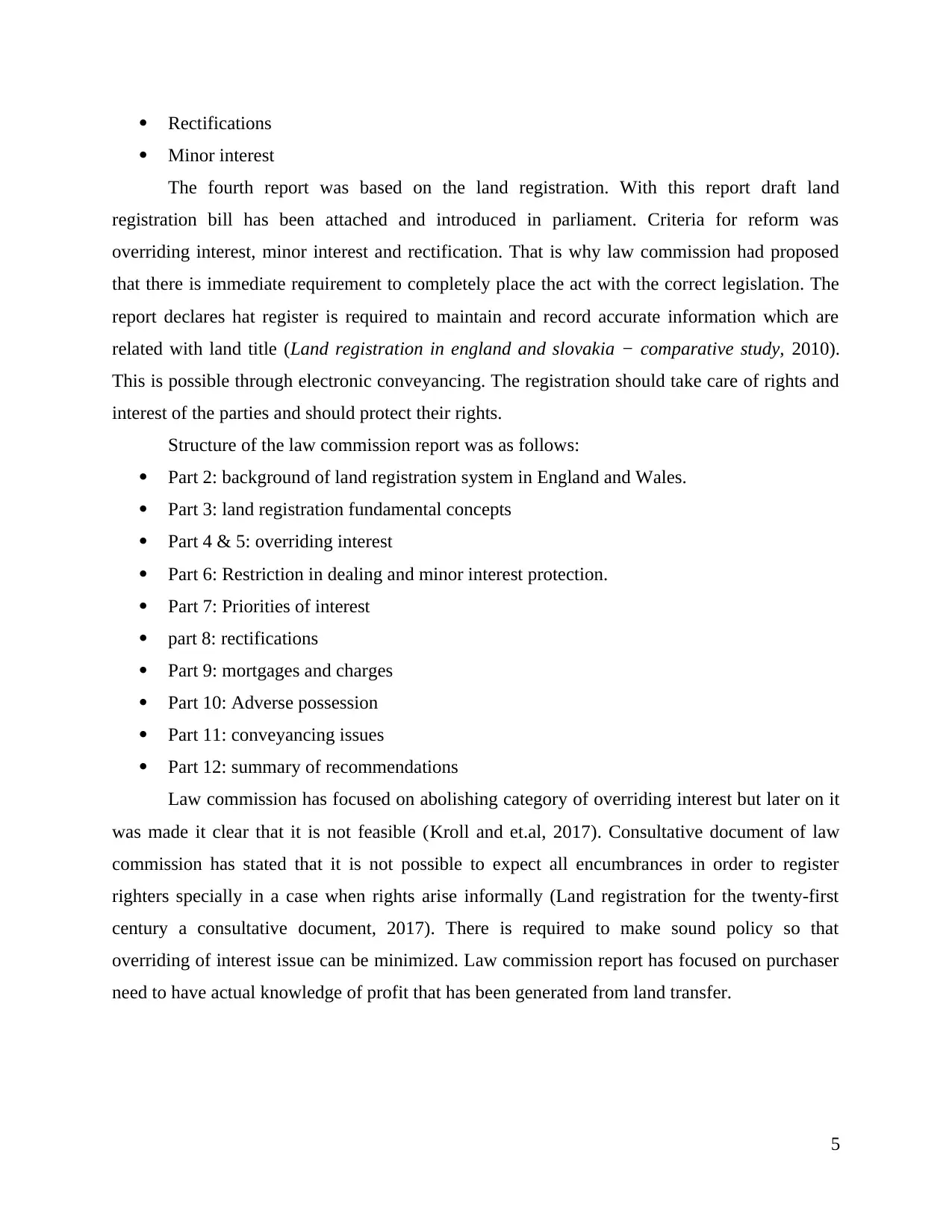
Rectifications
Minor interest
The fourth report was based on the land registration. With this report draft land
registration bill has been attached and introduced in parliament. Criteria for reform was
overriding interest, minor interest and rectification. That is why law commission had proposed
that there is immediate requirement to completely place the act with the correct legislation. The
report declares hat register is required to maintain and record accurate information which are
related with land title (Land registration in england and slovakia − comparative study, 2010).
This is possible through electronic conveyancing. The registration should take care of rights and
interest of the parties and should protect their rights.
Structure of the law commission report was as follows:
Part 2: background of land registration system in England and Wales.
Part 3: land registration fundamental concepts
Part 4 & 5: overriding interest
Part 6: Restriction in dealing and minor interest protection.
Part 7: Priorities of interest
part 8: rectifications
Part 9: mortgages and charges
Part 10: Adverse possession
Part 11: conveyancing issues
Part 12: summary of recommendations
Law commission has focused on abolishing category of overriding interest but later on it
was made it clear that it is not feasible (Kroll and et.al, 2017). Consultative document of law
commission has stated that it is not possible to expect all encumbrances in order to register
righters specially in a case when rights arise informally (Land registration for the twenty-first
century a consultative document, 2017). There is required to make sound policy so that
overriding of interest issue can be minimized. Law commission report has focused on purchaser
need to have actual knowledge of profit that has been generated from land transfer.
5
Minor interest
The fourth report was based on the land registration. With this report draft land
registration bill has been attached and introduced in parliament. Criteria for reform was
overriding interest, minor interest and rectification. That is why law commission had proposed
that there is immediate requirement to completely place the act with the correct legislation. The
report declares hat register is required to maintain and record accurate information which are
related with land title (Land registration in england and slovakia − comparative study, 2010).
This is possible through electronic conveyancing. The registration should take care of rights and
interest of the parties and should protect their rights.
Structure of the law commission report was as follows:
Part 2: background of land registration system in England and Wales.
Part 3: land registration fundamental concepts
Part 4 & 5: overriding interest
Part 6: Restriction in dealing and minor interest protection.
Part 7: Priorities of interest
part 8: rectifications
Part 9: mortgages and charges
Part 10: Adverse possession
Part 11: conveyancing issues
Part 12: summary of recommendations
Law commission has focused on abolishing category of overriding interest but later on it
was made it clear that it is not feasible (Kroll and et.al, 2017). Consultative document of law
commission has stated that it is not possible to expect all encumbrances in order to register
righters specially in a case when rights arise informally (Land registration for the twenty-first
century a consultative document, 2017). There is required to make sound policy so that
overriding of interest issue can be minimized. Law commission report has focused on purchaser
need to have actual knowledge of profit that has been generated from land transfer.
5
Paraphrase This Document
Need a fresh take? Get an instant paraphrase of this document with our AI Paraphraser
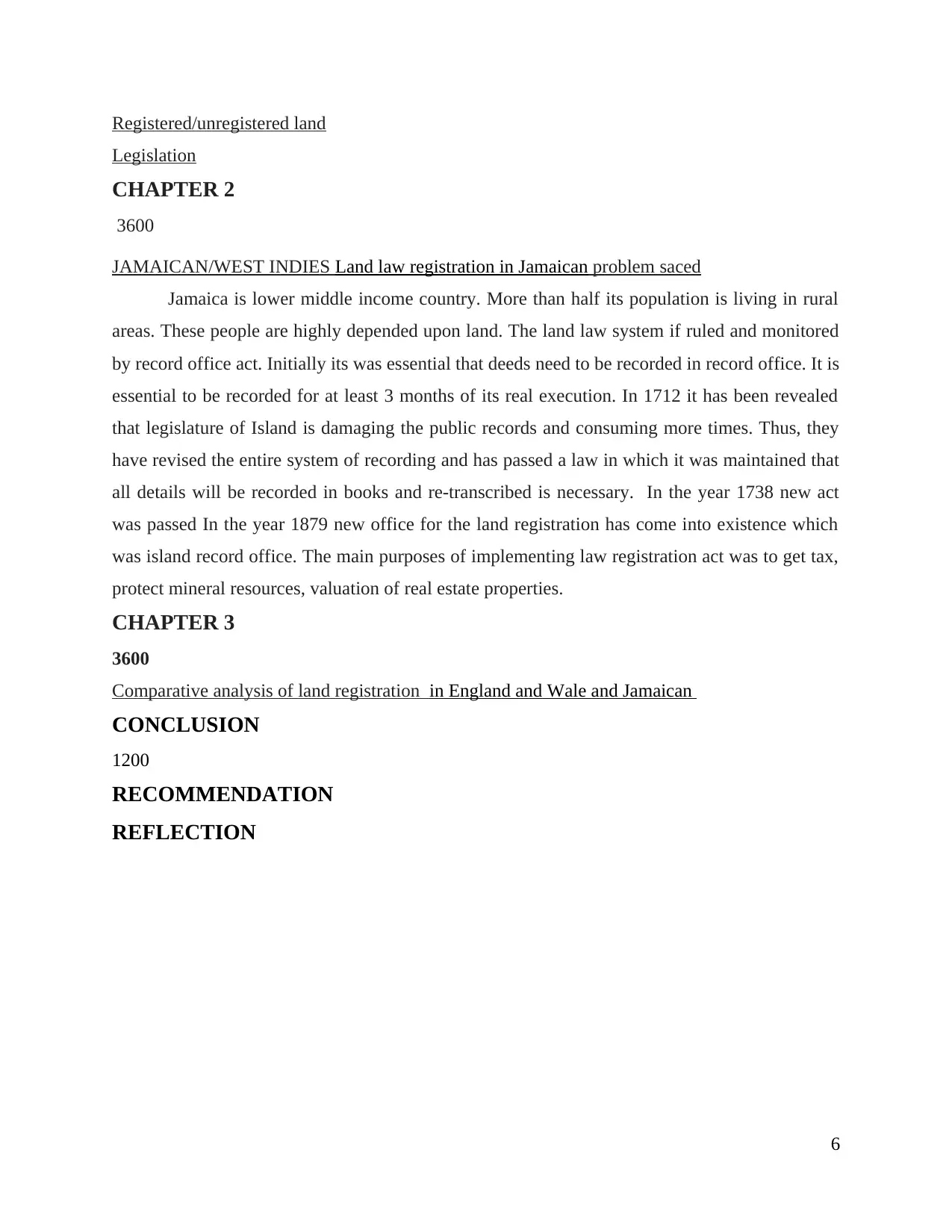
Registered/unregistered land
Legislation
CHAPTER 2
3600
JAMAICAN/WEST INDIES Land law registration in Jamaican problem saced
Jamaica is lower middle income country. More than half its population is living in rural
areas. These people are highly depended upon land. The land law system if ruled and monitored
by record office act. Initially its was essential that deeds need to be recorded in record office. It is
essential to be recorded for at least 3 months of its real execution. In 1712 it has been revealed
that legislature of Island is damaging the public records and consuming more times. Thus, they
have revised the entire system of recording and has passed a law in which it was maintained that
all details will be recorded in books and re-transcribed is necessary. In the year 1738 new act
was passed In the year 1879 new office for the land registration has come into existence which
was island record office. The main purposes of implementing law registration act was to get tax,
protect mineral resources, valuation of real estate properties.
CHAPTER 3
3600
Comparative analysis of land registration in England and Wale and Jamaican
CONCLUSION
1200
RECOMMENDATION
REFLECTION
6
Legislation
CHAPTER 2
3600
JAMAICAN/WEST INDIES Land law registration in Jamaican problem saced
Jamaica is lower middle income country. More than half its population is living in rural
areas. These people are highly depended upon land. The land law system if ruled and monitored
by record office act. Initially its was essential that deeds need to be recorded in record office. It is
essential to be recorded for at least 3 months of its real execution. In 1712 it has been revealed
that legislature of Island is damaging the public records and consuming more times. Thus, they
have revised the entire system of recording and has passed a law in which it was maintained that
all details will be recorded in books and re-transcribed is necessary. In the year 1738 new act
was passed In the year 1879 new office for the land registration has come into existence which
was island record office. The main purposes of implementing law registration act was to get tax,
protect mineral resources, valuation of real estate properties.
CHAPTER 3
3600
Comparative analysis of land registration in England and Wale and Jamaican
CONCLUSION
1200
RECOMMENDATION
REFLECTION
6
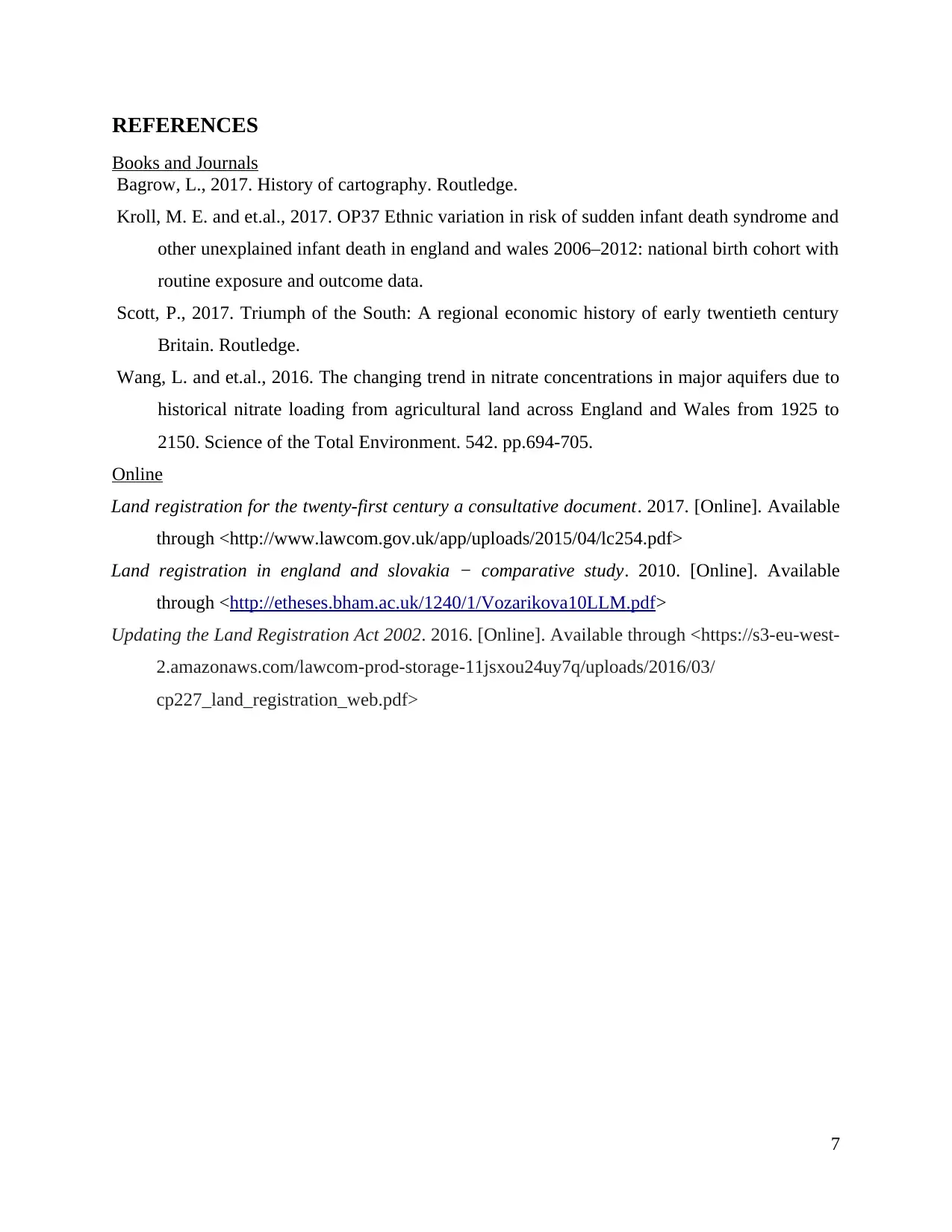
REFERENCES
Books and Journals
Bagrow, L., 2017. History of cartography. Routledge.
Kroll, M. E. and et.al., 2017. OP37 Ethnic variation in risk of sudden infant death syndrome and
other unexplained infant death in england and wales 2006–2012: national birth cohort with
routine exposure and outcome data.
Scott, P., 2017. Triumph of the South: A regional economic history of early twentieth century
Britain. Routledge.
Wang, L. and et.al., 2016. The changing trend in nitrate concentrations in major aquifers due to
historical nitrate loading from agricultural land across England and Wales from 1925 to
2150. Science of the Total Environment. 542. pp.694-705.
Online
Land registration for the twenty-first century a consultative document. 2017. [Online]. Available
through <http://www.lawcom.gov.uk/app/uploads/2015/04/lc254.pdf>
Land registration in england and slovakia − comparative study. 2010. [Online]. Available
through <http://etheses.bham.ac.uk/1240/1/Vozarikova10LLM.pdf>
Updating the Land Registration Act 2002. 2016. [Online]. Available through <https://s3-eu-west-
2.amazonaws.com/lawcom-prod-storage-11jsxou24uy7q/uploads/2016/03/
cp227_land_registration_web.pdf>
7
Books and Journals
Bagrow, L., 2017. History of cartography. Routledge.
Kroll, M. E. and et.al., 2017. OP37 Ethnic variation in risk of sudden infant death syndrome and
other unexplained infant death in england and wales 2006–2012: national birth cohort with
routine exposure and outcome data.
Scott, P., 2017. Triumph of the South: A regional economic history of early twentieth century
Britain. Routledge.
Wang, L. and et.al., 2016. The changing trend in nitrate concentrations in major aquifers due to
historical nitrate loading from agricultural land across England and Wales from 1925 to
2150. Science of the Total Environment. 542. pp.694-705.
Online
Land registration for the twenty-first century a consultative document. 2017. [Online]. Available
through <http://www.lawcom.gov.uk/app/uploads/2015/04/lc254.pdf>
Land registration in england and slovakia − comparative study. 2010. [Online]. Available
through <http://etheses.bham.ac.uk/1240/1/Vozarikova10LLM.pdf>
Updating the Land Registration Act 2002. 2016. [Online]. Available through <https://s3-eu-west-
2.amazonaws.com/lawcom-prod-storage-11jsxou24uy7q/uploads/2016/03/
cp227_land_registration_web.pdf>
7
1 out of 9
Related Documents
Your All-in-One AI-Powered Toolkit for Academic Success.
+13062052269
info@desklib.com
Available 24*7 on WhatsApp / Email
![[object Object]](/_next/static/media/star-bottom.7253800d.svg)
Unlock your academic potential
© 2024 | Zucol Services PVT LTD | All rights reserved.




